<Back to Index>
- Defense Minister Gustav Noske, 1868
- Transportation Minister and Colonial Minister Johannes Bell, 1868
- Minister Without Portfolio Eduard David, 1863
PAGE SPONSOR
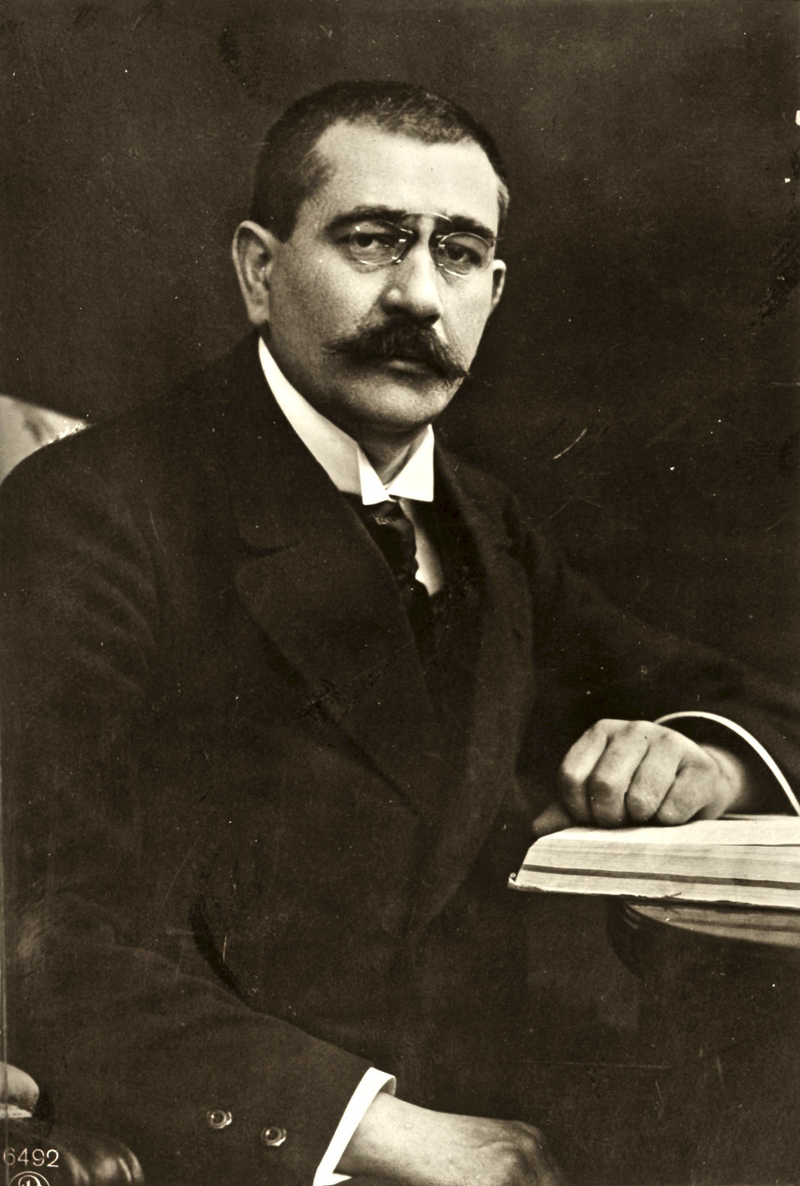
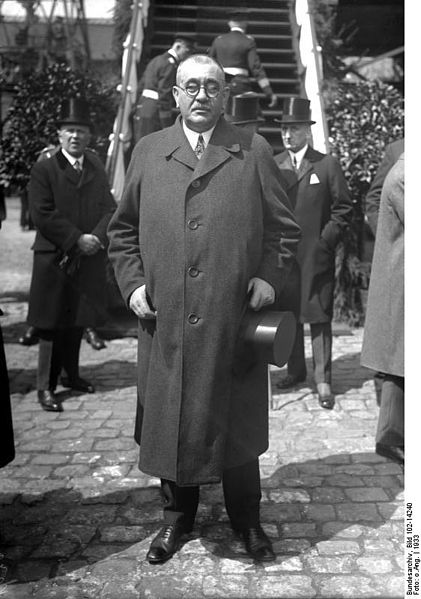
Gustav Noske (July 9, 1868 - November 30, 1946) was a German politician of the Social Democratic Party of Germany (SPD). He served as the first Minister of Defense of Germany (Reichswehrminister) between 1919 and 1920.
Noske was born in Brandenburg an der Havel. He was a Master Butcher by trade, who had climbed the political ladder within the trade union movement. He was a member of the Social Democratic Party and became a member of the German Parliament in 1906, where he remained during World War I. He had long shown an interest in military and colonial affairs.
Noske is regarded as a moderate and pragmatic Social Democrat; however, many in the party in his lifetime were angered by such acts as Noske's voting for the construction of new dreadnoughts for the German Navy, at the time when the pre - 1914 Social Democratic Party took a strongly anti - militarist and anti - war position. Noske justified his act by the argument that naval construction created jobs for shipyard workers. In the 1914 - 1918 period, the Party's outspoken support for Germany's participation in the First World War in effect affirmed the deviant position taken by Noske in the pre - war years.
Best known for putting down the Communist and left wing risings throughout Germany in early 1919, Noske was and remains a controversial figure. To crush the incipient insurgency, he permitted and even encouraged the organization and employment of right wing, nationalist Freikorps. Between January 10 and January 17, 1919 they, together with Reichswehr troops under the command of General von Lüttwitz, crushed the Spartacist revolt by military force, the leaders - Rosa Luxemburg and Karl Liebknecht - were murdered in the Berlin Tiergarten by members of the 1st Horse Guards Division subsequent to being arrested after the fighting had ended on January 17. On the other hand, he defused the Kiel Mutiny of 1918 without a shot being fired.
One of the few Social Democrats willing to work with the traditional officer class which continued to dominate the Army, Noske was instrumental in restoring order and preventing a German version of the Bolshevik October Revolution in Russia.
Noske was Governor of the Province of Hanover from 1920 on, but was dismissed by the Nazi government in 1933. In 1944 he was arrested by the Gestapo under suspicion of involvement in the July 20 plot against Adolf Hitler. Noske was freed by advancing Allied troops and lived in Frankfurt am Main afterwards. He died while preparing for a lecture tour of the United States.
SPD politician Johannes Kahrs, a leading contemporary representative of the moderate wing of the SPD, has described Gustav Noske as one of his political role models.
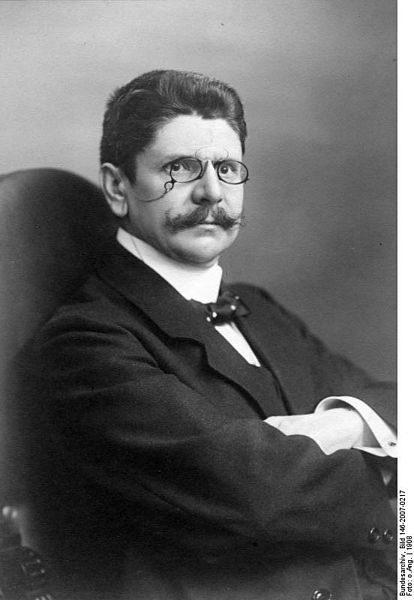
Johannes Bell (23 September 1868 – 21 October 1949) was a German jurist and politician from the Centre Party. During the Weimar Republic era, he briefly served as Minister of Colonial Affairs, Minister of Transport (1919/20), and as Minister of Justice (1926/27). He was one of the two German representatives who signed the Treaty of Versailles in June 1919.
Johannes Bell was born on 23 September 1868 in Essen in what was then the Rhine Province of Prussia, as the son of Josef Bell, a land surveyor, and his wife Josefine (née Steuer). A Roman Catholic, Bell married Trude Nünning in 1896.[1]
Bell studied law at Tübingen, Leipzig and Bonn and was awarded a Doctor of Law in 1890.[2]
He started practicing law in Essen in 1894 and in 1900 became a notary. After 1908, Bell was a member of the Prussian diet. From 1911/12 to 1933 (i.e. both in the Empire and in the Weimar Republic), he was a member (and 1920 to 1926 Vice-President) of the Reichstag for the Catholic German Center Party or Zentrum. He was also a member of the constituent assemblies, Weimar National Assembly and its Prussian equivalent, the Preußische Landesversammlung.[1][2]
Bell was a member of the first democratically elected governments of Germany, the Cabinet Scheidemann, Cabinet Bauer and Cabinet Müller I. In February 1919, Bell became Reichskolonialminister (Minister of Colonial Affairs) and he held that post until the ministry was dissolved in November 1919. Together with Hermann Müller (SPD), Bell signed the Treaty of Versailles for Germany on 28 June 1919. After June 1919, he also was Reichsverkehrsminister (Minister of Transport). In this capacity, Bell was instrumental in the creation of the Deutsche Reichsbahn, which involved the nationalization of various regional railway lines.[1] He remained in office just long enough to see the National Assembly approve the unification of railways and then resigned in May 1920.[3]
Bell was also a senior figure in the parliamentary group of the Zentrum and the author of numerous publications, making him a well-known political figure.[1]
Johannes Bell once again served as a minister of Germany from July 1926 to February 1927 in the cabinet of Wilhelm Marx, as Reichsjustizminister (Minister of Justice) and minister for the occupied territories. After 1930, he was chairman of the Reichstag committee on violations of international law.[1][2]
After the Nazis seized power in 1933, Bell retired from politics. He died on 21 October 1949 in Würgassen/Weser.[1]
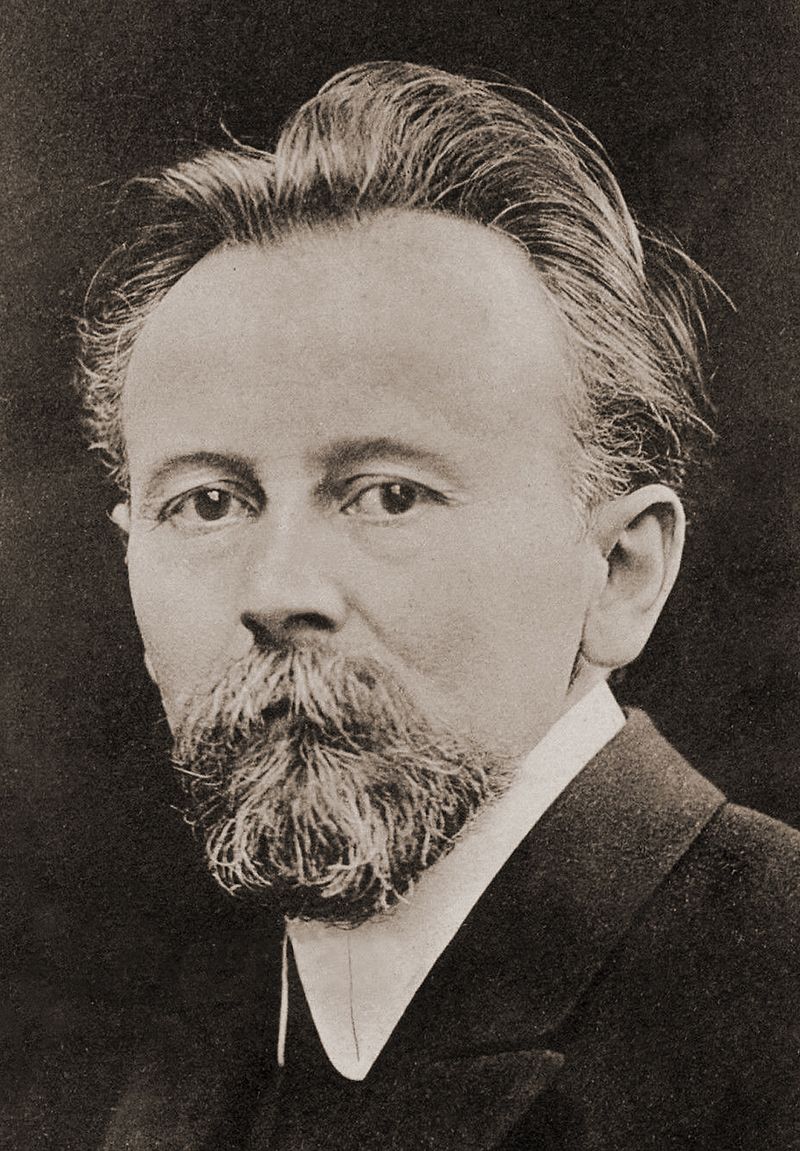
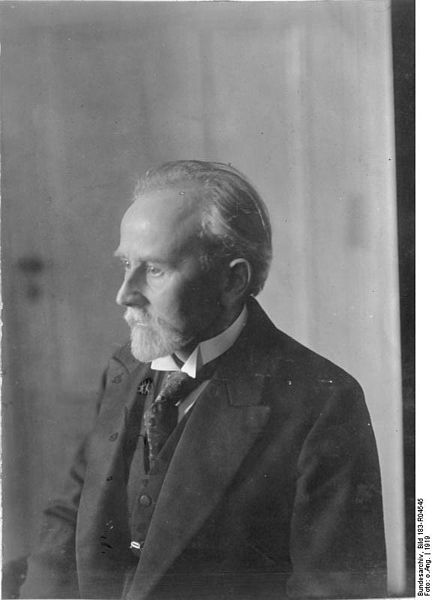
Eduard Heinrich Rudolph David (11 June 1863 – 24 December 1930) was a German politician. He was an important figure in the history of the Social Democratic Party of Germany (SPD) and of the German political labour movement. After the German Revolution of 1918–19 he was a Minister without portfolio in the government of Philipp Scheidemann, before becoming Minister of the Interior in June 1919 in the succeeding government headed by Gustav Bauer. David remained in that position until October of that year.
David was also briefly the first president of the Weimar
National Assembly which drew up the Weimar Constitution
and ratified the Treaty of Versailles in 1919.
Eduard David was born on 11 June 1863 in Ediger/Mosel as the son of Johann Heinrich David, a Prussian civil servant, and his wife Wilhelmine Elisabeth (née Werner).[1] After completing a four-year commercial apprenticeship (kaufmännische Lehre), David studied at the university at Giessen where he was introduced to socialist ideals. He worked as a teacher at a gymnasium and establishing a newspaper, the Mitteldeutsche Sonntagszeitung, in 1893. David's support for the Social Democratic Party of Germany (SPD) led to his dismissal from the civil service in 1894.[1]
David was married twice. In 1896, he married Gertrud
Swiderski (one daughter) and in 1911 Hermine Schmidt (one
son).[1]
In the 1890s, David became a proponent of agricultural policies favouring small holdings, arguing for their viability in a series of articles in the Sozialdemokrat in August and September 1894. David argued against the traditional Marxist idea that small landholdings would increasingly be replaced by large estates, marking David as among the first Revisionists in his party.[1]
This journalism on the agrarian question would later be expanded into his major book-length work, Sozialismus und Landwirtschaft (Socialism and Agriculture), in 1903.
From 1896, David was a member of the Landtag of
Hesse and after 1903 a member of the Reichstag for the
SPD. He was one of the leading politicians of the
"Majority" SPD when the party split during the First World War and was
instrumental in framing his party's policy stand on the
war.[1]
In October 1918, when the SPD became part of the Imperial government for the first time under the new chancellor Max von Baden, David became Under Secretary at the Foreign Office.[1]
In February 1919, David was elected president of the new National Assembly,[1] but as part of a deal establishing the first democratically elected government, the Scheidemann cabinet. He relinquished that post in favour of Constantin Fehrenbach (Zentrum) and became Minister without Portfolio under the new Ministerpräsident, Philipp Scheidemann (SPD).
After Scheidemann's cabinet resigned in June 1919 in
protest over the stipulations of the Treaty of Versailles,
a new government was formed by Gustav Bauer (SPD) and
David became Reichsminister des Innern (Minister
of the Interior), a position he held from 21 June to 4
October 1919.[1]
In early October, the German Democratic Party (DDP) which
had left the coalition government in June rejoined, thus
reestablishing the Weimar Coalition of SPD, DDP and
Zentrum. Erich Koch-Weser (DDP) took over as Minister of
the Interior and David once again was Minister without
Portfolio. He retained this position in the first cabinet
of Hermann Müller, who formed the new government when the
Cabinet Bauer resigned in March 1920.[1]
In 1922, David was appointed Reichsbevollmächtigter
in Hesse and from 1923 to 1927 he taught political
sciences at what was then the Technische Hochschule
Darmstadt. He died on 24 December 1930 in Berlin.[1]
Eduard David died in Berlin on December 24, 1930.
David is today considered a key figure in the history of the political labour movement in Germany as he influenced the development of the SPD in the pre-World War I period as one of the leading advocates of reformist policies.[1]